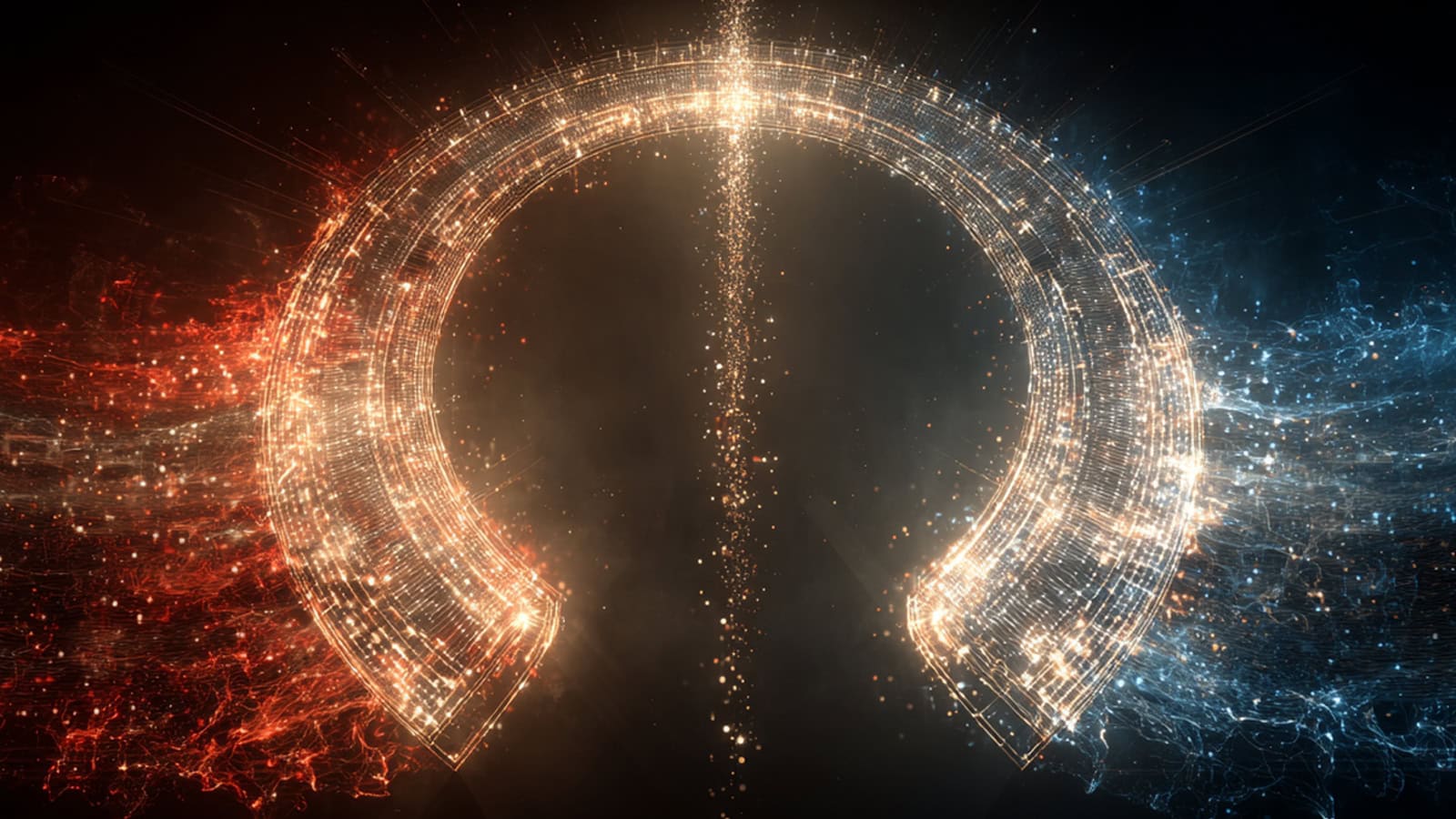
Become a member to access the full episode
Start building your big picture mind & support the global emergence of Integral consciousness

“Integral Life is the most important and globally-relevant platform for the leading edge of Integral consciousness evolution”
– Eugene P.
Perspective Shift:
- Polarization is a symptom, not the disease. The center itself is broken. The call to “return to moderation” misses the point entirely. Conventional politics has failed to address fundamental crises, creating the hunger for radical alternatives. The solution isn’t to retreat to a dysfunctional middle ground, but to transcend the entire framework through post-conventional coalitions that maintain democratic integrity while pursuing transformative change.
- Your mind is not your own — it’s your unique internalization of society as a whole. Following Vygotsky’s mediation lens, what you experience as individual thought is actually the social world speaking through you. Language doesn’t just express interior states; it creates them. Political transformation happens through narrative and linguistic shifts, not just policy changes. Change the stories, change the consciousness, change the world.
- Every domain has its own rules — and confusion kills clarity. Modal confusion is the semantic catalyst of chaos. When politics collapses into entertainment, science into propaganda, and fiction into fact, coherent discourse becomes impossible. The “double-click illusion” makes us believe we have unmediated access to reality when everything is mediated. Master the art of modal choreography — knowing which domain you’re in, and what counts as success within that domain.
- The algorithm is not neutral, it’s a profit-driven polarization machine. Recommendation systems optimize for engagement, which means amplifying outrage and identity signaling. The “algorithmic undertow” creates demi-realities that feel complete but are too thin to provide reliable foundation. What feels like organic political awakening may be manufactured addiction to emotional intensity.
- Coalition transcendence beats moderate compromise. Germany’s grand coalitions reveal a possible path forward: maintain democratic norms while bringing together opposing viewpoints to address existential challenges. This isn’t finding the mushy middle—it’s creating new political containers that can hold paradox and complexity. The third attractor isn’t between chaos and tyranny; it’s beyond both.
Something is profoundly broken in our political discourse, and it’s not what you think.
While pundits obsess over left-versus-right tribalism, a more fundamental crisis is unfolding: the very categories we use to make sense of politics have become weapons of confusion. This conversation with meta-theorists Mark Edwards and Bruce Alderman reveals why voters can simultaneously support Trump and AOC, why “returning to the center” won’t save us, and how the same algorithmic forces that promise connection are actually manufacturing our disconnection.
The pain is real and immediate. You scroll through your feed and feel that familiar cocktail of rage and helplessness. The world seems to be splitting apart along incomprehensible lines. Friends become strangers over political disagreements that feel existentially urgent yet somehow hollow. Traditional institutions feel simultaneously too powerful and completely impotent. The center cannot hold because the center itself has become a swamp of corporate-captured mediocrity that addresses none of the crises demanding our attention.
Edwards introduces Jean-Pierre Faye’s “Horseshoe Theory”—the counterintuitive insight that political extremes don’t oppose each other so much as curve toward each other. When polarization intensifies beyond democratic norms, far-left and far-right positions begin sharing totalitarian DNA. Both promise to drain the swamp by burning down the system. Both demand you surrender democratic discourse for revolutionary certainty. The horseshoe reveals why your most passionate political opponents often sound eerily familiar in their methods, even when their content differs completely.
But here’s where it gets interesting: this isn’t inevitable political physics. It’s manufactured confusion. Bruce’s analysis of “modal collapse” shows how our meaning-making systems have been deliberately scrambled. When science becomes propaganda, entertainment becomes politics, and fiction becomes fact, coherent public discourse becomes impossible. The “double-click illusion” convinces us we’re accessing unmediated reality when every click feeds algorithms optimized for engagement, not truth. We think we’re political actors; we’re actually products being sold to advertisers who profit from our outrage.
The conventional solution—moderate compromise—fails because it doesn’t address the underlying crises that created the hunger for radical alternatives in the first place. Climate collapse, economic inequality, institutional decay, technological disruption—these aren’t problems you solve by splitting the difference. They require what Edwards calls “post-conventional coalitions”: alliances that transcend traditional left-right categories while maintaining democratic integrity. Think Germany’s grand coalitions addressing climate change through cooperation across the political spectrum, not American-style gridlock disguised as bipartisanship.
This demands a new kind of political maturity. Edwards distinguishes between emancipatory social science—the work of cleaning up “demi-reality” into functional complexity—and contemplative spirituality. Both are necessary; neither is sufficient alone. The temptation to collapse these domains creates dangerous confusions: spiritual bypassing that ignores systemic injustice, or scientistic reductionism that denies the mystery of existence. The path forward requires what Alderman calls “modal choreography”—the ability to move fluidly between different ways of knowing while respecting their unique integrity.
Perhaps most importantly, this isn’t a problem individuals can solve through better personal choices or deeper self-awareness. The crisis is collective, which means the solution must be collective too. The concept of “sangha as sense organ” points toward distributed intelligence networks capable of metabolizing complexity without collapse. These aren’t traditional institutions but living epistemic architectures—communities of practice that can hold paradox, integrate opposing perspectives, and generate coherent responses to unprecedented challenges.
The stakes couldn’t be higher. We’re teetering between civilizational collapse and authoritarian lockdown, with a narrow path toward what they call the “third attractor”—a regenerative coherence that makes freedom and order mutually amplifying rather than mutually destructive. This isn’t utopian fantasy; it’s practical necessity. The question isn’t whether transformation is coming, but whether we’ll navigate it consciously or be dragged through it blindly.
The antidote to the politics of confusion turns out to be surprisingly elegant: learn to recognize which game you’re playing, master its rules, and then coordinate with others who share that commitment to clarity. In a world drowning in manufactured noise, the revolutionary act might just be learning to think together again.
 Key Questions
Key Questions
Here are some questions you can contemplate while listening to this discussion. We suggest you take some time to use these as journaling prompts.
- What stories am I unconsciously performing? Which political narratives have quietly colonized my thinking, and what would it mean to author my own instead?
- How does the horseshoe show up in my own thinking? Where do my extremes curve back toward methods I claim to oppose—apocalyptic language, enemy-making, purity tests—and which democratic norms am I tempted to abandon to “win”?
- How do algorithms shape my political reality? How much of my certainty is manufactured by engagement-optimized feeds, and how would my worldview shift if inputs were curated for understanding rather than compulsion?
- What coalitions am I avoiding due to ideological purity? Whom could I work with if I prioritized shared democratic norms over identical policies, and what social cost am I willing to pay to build those bridges?
- How do I participate in “demi-reality” creation? Which partial truths do I inflate into total worlds, mistaking my perspective for reality, and how do my habits amplify the very confusion I critique?
- What would “modal choreography” look like in my daily life? Can I move fluidly among analysis, intuition, emotion, and embodiment while respecting each mode’s integrity, and where do I cling to one when another would serve better?
- How do I distinguish between healthy skepticism and cynical nihilism? When does my questioning clarify and enable action, and when does it corrode agency into paralysis?
- Where am I seeking simple solutions to complex problems?
About Mark Edwards
MARK EDWARDS is a psychologist with a Masters degree in developmental psychology and a Ph.D. (distinction) in organisation theory from the University of Western Australia, one of the pre-eminent universities in Australia. He has worked with people with disabilities for more than 20 years. He is currently tutoring in strategic management and human resource management courses in the Business School at UWA. His academic publications have been in the areas of futures studies, leadership, management and organisation theory, and integral metatheory.
About Bruce Alderman
Bruce Alderman, MA, is an affiliate faculty at John F. Kennedy University in the Consciousness and Transformative Studies and Holistic Counseling Psychology departments. After years of moderating several integral discussion forums of his own, including Integral Postmetaphysical Spirituality and Integral Scholarship and Practice, he is venturing into production of integral video content himself.


